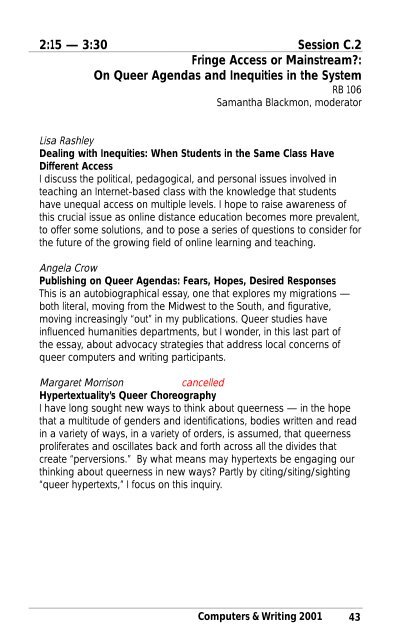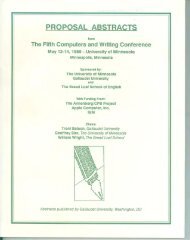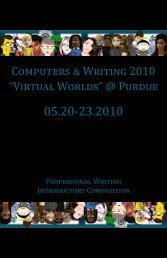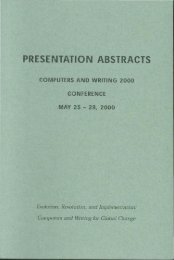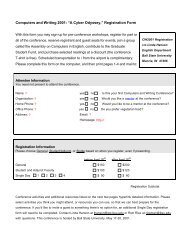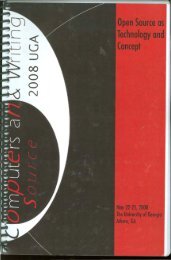CW2001 Program - Computers and Writing
CW2001 Program - Computers and Writing
CW2001 Program - Computers and Writing
You also want an ePaper? Increase the reach of your titles
YUMPU automatically turns print PDFs into web optimized ePapers that Google loves.
2:15 — 3:30 Session C.2<br />
Fringe Access or Mainstream:<br />
On Queer Agendas <strong>and</strong> Inequities in the System<br />
RB 106<br />
Samantha Blackmon, moderator<br />
Lisa Rashley<br />
Dealing with Inequities: When Students in the Same Class Have<br />
Different Access<br />
I discuss the political, pedagogical, <strong>and</strong> personal issues involved in<br />
teaching an Internet-based class with the knowledge that students<br />
have unequal access on multiple levels. I hope to raise awareness of<br />
this crucial issue as online distance education becomes more prevalent,<br />
to offer some solutions, <strong>and</strong> to pose a series of questions to consider for<br />
the future of the growing field of online learning <strong>and</strong> teaching.<br />
Angela Crow<br />
Publishing on Queer Agendas: Fears, Hopes, Desired Responses<br />
This is an autobiographical essay, one that explores my migrations —<br />
both literal, moving from the Midwest to the South, <strong>and</strong> figurative,<br />
moving increasingly “out” in my publications. Queer studies have<br />
influenced humanities departments, but I wonder, in this last part of<br />
the essay, about advocacy strategies that address local concerns of<br />
queer computers <strong>and</strong> writing participants.<br />
Margaret Morrison<br />
cancelled<br />
Hypertextuality’s Queer Choreography<br />
I have long sought new ways to think about queerness — in the hope<br />
that a multitude of genders <strong>and</strong> identifications, bodies written <strong>and</strong> read<br />
in a variety of ways, in a variety of orders, is assumed, that queerness<br />
proliferates <strong>and</strong> oscillates back <strong>and</strong> forth across all the divides that<br />
create “perversions.” By what means may hypertexts be engaging our<br />
thinking about queerness in new ways Partly by citing/siting/sighting<br />
“queer hypertexts,” I focus on this inquiry.<br />
<strong>Computers</strong> & <strong>Writing</strong> 2001<br />
43


